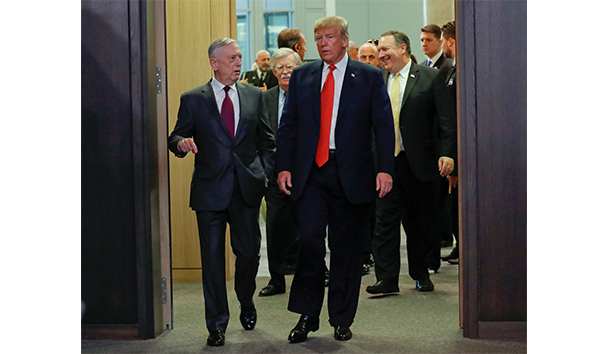President Donald Trump’s announcement last December 19 that he would immediately withdraw all U.S. forces from Syria (and one-half of the Afghan contingent) is the most important single decision of his presidency. The mission in Syria had never been about “regime change” in Damascus, or “eliminating Iranian influence,” or establishing Kurdish autonomy. Two years ago Trump accepted its continuation on the terms set by Obama in 2014: to help the Kurds fight the Islamic State. That mission has been accomplished; there is nothing “precipitous” about saying so and acting accordingly.
In the first days of the New Year Trump was under intense pressure from Sen. Lindsey Graham, et al., to reverse the decision; but assuming that he does not blink (and thus destroy his presidency), the significance of the withdrawal is twofold. This is the first time the President has openly defied the “adults” inside his team who have done their utmost to override his noninterventionist, antiglobalist instincts from the moment of his inauguration. It is also the first time that a foreign-policy decision by Trump, which is demonstrably correct and has been fiercely attacked by the bipartisan establishment, holds the potential to help him win the next election.
By making his announcement on Syria and thus triggering the resignation of Defense Secretary James Mattis, Trump has freed himself from one of a series of Swamp-bred saboteurs who have done him a lot of harm. Rex Tillerson, H.R. McMaster, and John Kelly are also gone, but Mike Pence, Mike Pompeo, and John Bolton remain. They are all seasoned Deep Staters who favor eternal wars for eternal hegemony. In fact, Pompeo and Bolton reasserted the need for the troops to remain in Syria, on various pretexts unrelated to ISIS, only weeks before Trump’s December 19 announcement.
The conditions of these people’s recognition as “adults” can be reduced to four practical principles. First: No withdrawal of any U.S. troops, from any area of deployment, at any moment in time, is a good thing. Second: No Pentagon budget is too big, regardless of “the threat” to be deterred or fought. Third: No spot on the planet is not vitally important to U.S. national security. And fourth: No détente with Russia is allowed.
Compromising on any one of these points is verboten to the intelligence, national-security, and military-industrial-congressional conglomerates, whose orthodoxy is supported by the media. For almost two years the “adults” proved effective in resisting Trump’s budding heresies and in pulling him in exactly the opposite direction—as evidenced by his backtracking on Russia after Helsinki last summer, and by his reluctant acceptance of yet another escalation in Afghanistan in August 2017.
Americans don’t elect presidents to have their subordinates stop them from implementing their policies, however. If Trump stays his course on Syria now (terminating Afghanistan can wait), a crack finally will have appeared in the area where all of the failed strategies of his predecessors merge into a single quagmire: the Middle East. It is therefore important that he display greater determination in defending his Syria decision. He also needs to accuse his critics of advocating an open-ended military commitment devoid of attainable objectives in a volatile region where all American interventions thus far have been futile or self-defeating.
The accusation that Trump is “letting our Kurdish allies down” is notably absurd. The Kurds welcomed American firepower in destroying the Islamic State, to be sure; but they fought ISIS out of their own desire for survival, not because they love America, and not because they were promised any particular form of self-government—let alone permanent U.S. protection—after the Caliphate was gone.
The reality on the ground is that if the U.S. had supported a self-governing Kurdish entity in northern Syria, Turkey and the government in Damascus would have found common ground in preventing its consolidation, even at the risk of clashing with the Americans. With U.S. forces gone, by contrast, the Kurds wisely have established a modus vivendi with Bashar’s forces, and the Turks accept the arrangement.
Trump understands that, in the aftermath of the Khashoggi affair, his reliance on Saudi Arabia’s Crown Prince as a strategic partner is over. Improving relations with Turkey, always desirable, is now an urgent necessity, while supporting Kurdish ambitions would yield no dividends. Since “Sultan” Erdogan is here to stay for many years to come, it is in the American interest to do what is needed to reboot relations with Ankara, the foremost regional power and a NATO partner.
Another objection to Trump’s decision, that ISIS will “make a comeback,” is disingenuous. This cannot happen because all major players in Syria will not allow it, and because the conditions that made its rise possible five years ago no longer prevail. Trump was right to tweet that “Russia, Iran, Syria & many others . . . will have to fight ISIS and others, who [sic] they hate, without us.” Add Turkey, the Kurds, and Hezbollah.
The Syrian operation was never authorized by Congress. Trump should challenge his detractors to seek such authorization in order to do what they claim should be done: remove Assad from power, curtail Russian influence, eliminate the presence of Iranians and their proxies, and create conditions for a political settlement that would reflect “our values.” By throwing down this gauntlet now and similar ones in the future, Trump will help ensure that no “adults” can torpedo his initiatives with impunity. In doing so he will be supported by his base. The folks who voted for him know the true cost of perpetual wars far better than Trump’s detractors.

Leave a Reply